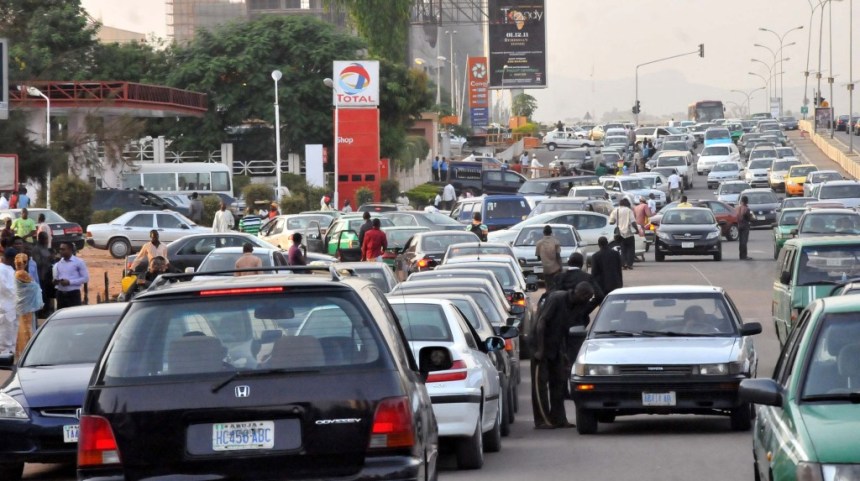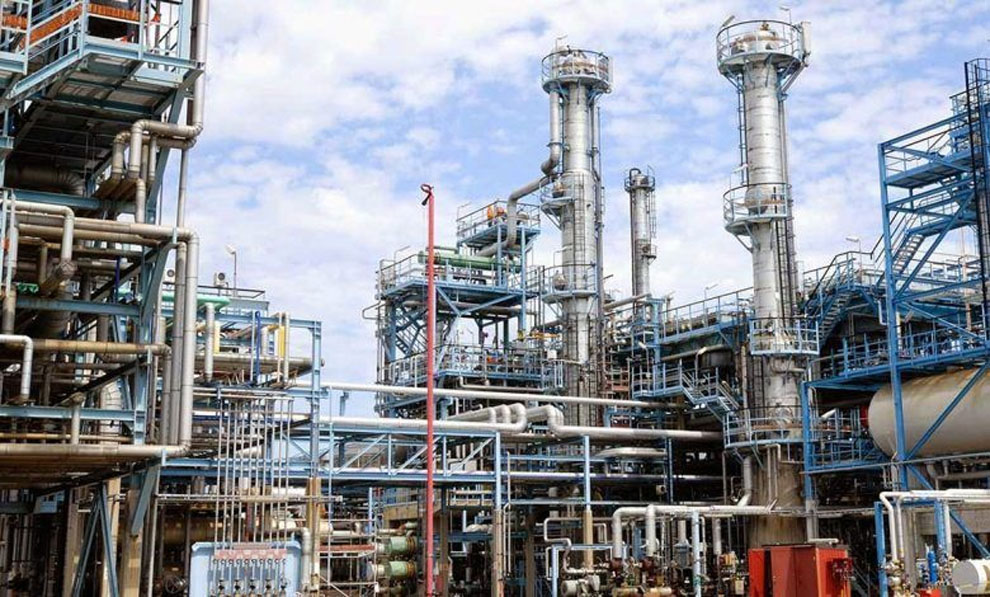Business
Fuel scarcity worsens in Lagos, Abuja, others as hawkers sell 1,500/litre

Fuel scarcity worsens in Lagos, Abuja, others as hawkers sell 1,500/litre
Queues for petrol have become longer at few filling stations in Lagos, Abuja and some major cities where the product is available to dispense.
Many have had to travel long distances to buy the commodity as most filling stations are not open for operation claiming that they have run out of petrol.
A report by The Punch on Monday stated that many depots for premium motor spirit (petrol) are currently dry.
Indeed, it reported that there was loading of fuel trucks in the Apapa depots as of Sunday.
It quoted a depot operator as saying that there was no fuel in almost all the depots on Sunday after the little available was supplied on Saturday.
Many motorists and those in need of petrol for their vehicles and power generators for electricity have had to resort to buying from the black market and hawkers vending the product along the road.
They sell petrol between N1,300 and N1,500.
On Sunday, from Iyana-Ipaja to Oshodi, only one filling station (Conoil at Airport junction) was open to sell fuel. And this was only in the night.
According to The Punch report, on Sunday in Abuja, while the few filling stations that dispensed the product sold it at between N660/litre and N800/litre, black marketers took advantage of the scarcity to hike the price to about N1,200/litre, depending on the area of purchase.
This came as oil marketers revealed that they were also queuing up to load petrol, adding that most depots lacked stock to sell.
“We, marketers, too are surprised that we couldn’t get fuel as we used to get at depots. We were worried too; we didn’t know the cause until the NNPC came out with a release on Saturday. Let’s just believe what the NNPC said, that they would arrest the situation,” the National Vice President of the Independent Petroleum Marketers Association of Nigeria, Hammed Fashola.
READ ALSO:
- Adhere to established regulations in petroleum industry, Arewa youths slam Dangote
- Hardship: Verydarkman in one-man Abuja street protest, Singer Portable tackles him
- Thousands mourn children killed in Golan Heights strike
“I believe that within this week, everything will be normalised by the time they push products to the depots for marketers to pick from. Ours is to pick from the depots, take it into our stations, and dispense to the public. But for now, most of the depots are dry. The implication of that is that the stations will be dry too. Most of our members have run out of stock. That is the cause of the queues we are experiencing now,” Fashola added.
He noted that marketers were still buying PMS “at a price that is above N700/litre from the private depots.”
“We are not yet getting direct supply from the NNPC as we are supposed to. What we are getting is so small compared to our population. That is why we are forced to go to the third parties, the private depot owners, and they are not helping matters with the kind of price they are putting out there.
“That is why independent marketers sell around N800 or so. Until we address this issue of direct supply, there will be issues. We keep shouting to the NNPC to look at that area properly because something is fundamentally wrong with our distribution channel and until they correct that, we will continue to have this issue of fuel scarcity.”
Executive Secretary of the Major Energies Marketers Association of Nigeria, Clement Isong, also said there had been low stock but could not tell when the situation would improve.
“The problem is that the stock is low because there have been some challenges in bringing the product into the country from the vessels. We are all queuing up for products, everybody is looking for the product from the NNPC. Only the NNPC knows when normalcy will be restored. It is the sole supplier,” he said.
NNPCL speaks
The Nigerian National Petroleum Company Limited (NNPC Ltd.) has explained that the fuel supply and distribution problem was caused by a hitch in the discharge operations of a couple of vessels.
Olufemi Soneye, the chief corporate communications officer, NNPC Ltd., made this known on Saturday in a statement while reacting to the current queues and scarcity being witnessed in Lagos and the Federal Capital Territory.
“The NNPC Ltd. wishes to state that the tightness in fuel supply and distribution witnessed in some parts of Lagos and the FCT is as a result of a hitch in the discharge operations of a couple of vessels,” Mr Soneye said.
Fuel scarcity worsens in Lagos, Abuja, others as hawkers sell 1,500/litre
Business
Naira exchanges N1,650/$ in parallel market

Naira exchanges N1,650/$ in parallel market
Yesterday, the Naira appreciated N1,650 per dollar in the parallel market, compared to N1,655 on Monday.
Similarly, the Naira appreciated to N1,535 per dollar in the official foreign exchange market.
Data published by the Central Bank of Nigeria, CBN, showed that the exchange rate for the Nigerian Foreign Exchange Market (NFEM) fell to N1,535 per dollar from N1,537 per dollar on Monday, indicating N2 appreciation for the naira.
READ ALSO:
- Tension as Anambra community union asks monarch to stop Ofala Festival
- Exchange rate ends 2024 at N1,535/$1, marking a 40.9% depreciation
- Lagos govt clears traders from rail tracks at Bolade, Oshodi
Consequently, the margin between the parallel market and NFEM rate narrowed to N115 per dollar from N118 per dollar on Monday.
Naira exchanges N1,650/$ in parallel market
Business
Exchange rate ends 2024 at N1,535/$1, marking a 40.9% depreciation

Exchange rate ends 2024 at N1,535/$1, marking a 40.9% depreciation
The exchange rate between the naira and the dollar ended the year at N1,535/$1 representing a 40.9% depreciation for 2024.
The official exchange rate between the naira and dollar closed in 2023 at N907.11/$1 thus depreciating by 40.9% for the year which compares to a 49.1% devaluation at the end of 2023.
READ ALSO:
- Lagos govt clears traders from rail tracks at Bolade, Oshodi
- Four countries that won’t celebrate New Year
- Social media abuzz over Fayose claim of N50m donation to VeryDarkMan’s NGO
Nigeria introduced several foreign exchange policies in 2024 as the central bank expanded on market-friendly forex policies to attract foreign investors.
Meanwhile, on the parallel market where the exchange rate is sold unofficially, the naira exchanged for N1,660 to the dollar when compared to N1,215/$ according to Nairametrics tracking records. This represents a 26.8% depreciation.
Exchange rate ends 2024 at N1,535/$1, marking a 40.9% depreciation
Business
Warri refinery: Marketers hopeful of further petrol price drop

Warri refinery: Marketers hopeful of further petrol price drop
There was excitement on Monday as the Warri Refining and Petrochemical Company (WRPC) commenced partial production.
This is coming after nearly a decade of dormancy as the 125,000 barrels per day refinery was confirmed to be working at 60 per cent capacity, according to the Nigerian National Petroleum Company Limited (NNPCL).
The refinery, inactive since 2015 due to prolonged repairs, reportedly began refining activities last Saturday at its Area 1 plant, where crude oil was successfully pumped into the system.
This was coming about a month after the commencement of operations at the 60,000-barrel-per-day-old Port Harcourt Refinery.
The NNPCL Group Chief Executive Officer, Mele Kyari, announced the resumption of operation at the Warri Refinery during a tour of the facility on Monday.
Kyari was seen in a video posted by Channels TV addressing a tour team, which included the Chief Executive Officer of the Nigerian Midstream and Downstream Petroleum Regulatory Authority, Farouk Ahmed.
READ ALSO:
- Catholic priest sentenced to 11 years for criticising his president
- Warri refinery now operational, doing 125,000bpd – NNPCL boss
- Kwankwaso says no power-sharing agreement with Atiku, Obi
Earlier, Kyari explained that the inspection aimed to show Nigerians the level of work completed so far.
He said though the repairs on the facility were not 100 per cent complete, operations had commenced.
He said, “We are taking you through our plant. This plant is running. Although it is not 100 per cent complete, we are still in the process. Many people think these things are not real. They think real things are not possible in this country. We want you to see that this is real.”
With the addition of Warri Refinery, Nigeria’s refining capacity has further increased with marketers anticipating a further reduction in price of premium motor spirit (PMS).
The 650,000-barrel Dangote Refinery has commenced production in addition to the Port Harcourt Refinery with a total capacity of 210,000 barrels per day (bpd) comprising 60,000 bpd for the old plant and 150,000 bpd for the new plant.
It’s good for business, prices may reduce – Marketers
Major Energy Marketers’ Association of Nigeria (MEMAN) and the Independent Marketers Association of Nigeria (IPMAN) welcomed the revival of the Warri refinery, saying it would deepen competition, diversify supply and ultimately resort to price reduction.
Executive Secretary of MEMAN, Clem Isong in a chat with our correspondent stated that the Warri Refinery is the shortest route to the North, describing its revival as good news.
“The market becomes more competitive and we are diversifying supply,” he said.
On whether it would lead to price reduction, he stated, “There are many factors that affect price, competition is always good and you can always get your product at the best price.”
National Public Relations Officer of IPMAN, Alhaji Olanrewaju Okanlawon in a chat with our correspondent said, “If there is excess supply, it will keep bringing down the price. We now run a free market and it is about demand and supply. It will continue bringing down the price. It will decongest Lagos.”
Energy expert, Dr. Ayodele Oni said the resumption of Warri Refinery would boost the local refining capacity in addition to enabling the country to sell to other neighbouring countries.
“We can refine more and even have some to sell. We now stop being hewers of wood and drawers of water. We add value to what we produce and can make/ do more with our base resources. This is very pleasant news,” he said.
Warri refinery: Marketers hopeful of further petrol price drop
-

 Politics3 days ago
Politics3 days agoGbajabiamila speaks on his rumoured Lagos governorship ambition
-

 metro3 days ago
metro3 days agoFarotimi to pursue disbarment over arrest, defamation allegations
-

 Business2 days ago
Business2 days agoReal reason Dangote, NNPC drop petrol price — IPMAN
-

 Health2 days ago
Health2 days agoABU Teaching Hospital will begin kidney transplant in 2025 – CMD
-

 Sports1 day ago
Sports1 day agoAnthony Joshua prostrates before Governor Abiodun during Ogun visit
-

 metro3 days ago
metro3 days agoEl-Rufai accuses Tinubu govt of Yoruba agenda, Reno Omokri reacts
-

 metro3 days ago
metro3 days agoNigerian govt urged to intervene in Mozambique post-election violence
-

 Politics3 days ago
Politics3 days ago2027: Why PDP shouldn’t field northern presidential candidate – Ex-Atiku campaigner











